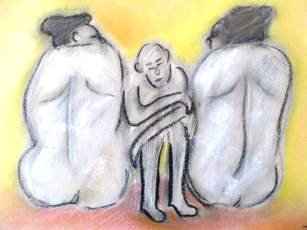
The Coffin On The Back Of The Tractor1.
All eyes were down as meaningless words resounded around the scruffy walls of the chapel.
He protected his children.
He loved his wife.
He lived life to the full.
The words fell like lost feathers, settling in any old order. Someone added their own quiet thought: everyday he drowned himself with 16 pints between the Silver Lounge and the Memorial Hall.
The cheap wooden coffin sat askew in front of the altar. Some children giggled, but no one tried to stop them.
The priest, who’d been called at the very last minute, struggled to find his place in the tatty bible that shook like something alive in his hands. His cheeks boasted some dashes of rose and a very obvious shine of whisky.
‘Just as man comes into this world with nothing, he leaves with nothing. He is part of a wider plan. Indeed, he is part of a wider cycle. There was a purpose in his life, just as there is a purpose in his death.’
A car horn blasted outside, an excuse for one or two to cough out loud. People struggled to stop themselves from swaying. Yes, it seems, one or two had already indulged themselves.
Two small children crawled between the disorderly feet.
‘That skinny man’s got whiskers coming out of his ears.’
The children curled under a bench and looked out at the grey faces; the dark, commodious clothes; the huddled formations.
‘There’s hair growing on his nose as well.’
The priest frowned and flipped his book shut, making a signal that needed no eye contact. Annoyance jiggled about on his eyelashes. It was clear to those who knew about such things that he’d decided to forget about the wordy passages he would normally be obliged to read.
Gangly men in black, one wearing orange trainers, shuffled to their positions.
‘He looks like a werewolf,’ said the little girl beneath the bench, pulling at her little friend’s shirt.
‘You’ll be like that when you grow up.’
‘No, dummy, that only happens to boys.’
‘It’s true! Girls grow moustaches when they grow up. You’re going to have to use a shaving machine.’
An old woman - who looked to the children very much like the Queen - covered her eyes with a handkerchief.
The men in black each took a corner of the casket, which was attached to a frame on wheels, and tried to move it as gracefully as possible. Someone was reminded of a shopping trolley. The wheels screeched as it was pushed down the aisle.
‘Who’s going to shave him when he’s in there?’
‘He’s going to grow a big beard, and his hair will get really long.’
‘I thought he was going to be burnt.’
‘Yeah he is, but his body goes up into the sky first.’
‘But how can he go up into the sky and be burnt as well?’
‘I don’t know.’
The organ screamed and made everyone jump. There was another false start, inhaling and farting, and then a horrible sound as too many notes were hit at the same time. The timing was out and only a few people knew the words.
‘She’s got arthritis,’ whispered an old woman to her husband. ‘Apparently they couldn’t get anyone else who didn’t charge.’
A jolly man tried to improve the sound of the droning voices.
The little girl asked, ‘What would happen if he was only asleep?’
‘He’d be snoring if he was asleep.’
‘Maybe he’s snoring really gently and we can’t hear him.’
‘The doctors would’ve hit him really hard to see if he felt it.’
‘Do you think he’ll be able to feel it when they burn him?’
‘Possibly.’
‘Is he naked when he goes into the sky?’
‘No, angels come and give him some new clothes.’
The priest signalled to everyone to get up and follow the coffin outside. The Queen stayed on her knees though, her eyes squeezed shut, her hands across her mouth and nose as if trying to avoid the smell of something horrid. The skinny man hovered beside her, not sure whether to console her, or follow everyone else and watch the coffin as it left the chapel.
Later, outside, the two children proudly sat on the fat wheels of the tractor. The little girl grinned, as if she were about to take the hot seat on a fantastic ride at a theme park. She was immune to the reproach of some of the mourners: discreet glances at the trainers on her feet, the tractor, the mud on the tyres. The coffin was slammed down onto the trailer and then covered with a flag from the local rugby club.
There had already been muttering from some that the use of a tractor was in bad taste. The man from the funeral company had agreed that he would drive it, although he insisted there wouldn’t be a big difference in the overall cost of the service and burial. He’d made it clear to the family that he thought it was inappropriate, but he would respect their wishes. Someone clapped when the headlights were flicked on and the gruff engine was brought to life.
2.
Tom Coughlin sat in painful silence on the forty minute trip to the hospital. The sun had just started to rise, drying up the remains of overnight drizzle on the quiet streets. The rest of the world was asleep, oblivious to the fact that someone else’s life was taking a dramatic turn. There were no cameo roles, no audience, no dramatics. Just massive, ordinary life.
He lifted his head towards the old Victorian-style hospital as they pulled into the entrance. Only a few rooms in the five-storey block were lit up, and he tried to picture what his father looked like lying in one of them. He wondered what he was going to say when he saw him. Would he be conscious?
The taxi driver suddenly started talking. He spoke about plans to extend the hospital, the lack of parking, how his sister had a terrible stay there once. Tom was finally glad to be standing in the reception on his own. He nervously smiled at the nurse who appeared.
‘Mr Coughlin’s son?’ She seemed to focus on his collar. ‘I can take you through to see your father straight away if you like.’
Another nurse, with a bloated and earnest look, pointed him towards a door. She stood back and made it clear he should go in on his own. As he turned the handle, he could smell burning chicken.
He’d expected to walk into a room full of machines, tubes and drips; instead it was dark, but he could make out the shape of his father lying flat on his back, on a bed near the window. He must be asleep, Tom thought to himself. But everything looked too simple. He switched on a small lamp and then moved towards the bed. An image came into his head: a criminal slinking into the room of someone asleep and vulnerable. Now, close to the bed, he could see his father’s face. Pale. Motionless.
Tom put his hands over his mouth as he suddenly realised what he was looking at. He let out a scream, more like a caterwaul. Then, staring at the floor, he half laughed and half cried, opening his eyes wide. No one said he was dead. He was supposed to be alive. Maybe he was still alive? He looked dead, but maybe he was just resting. But then where were all the tubes and monitors, and all the gadgets you would normally see around a hospital bed? He’s dead! He’s dead! He’s dead! He choked as he said the words. He couldn't stop, over and over, letting his screams burst through his shaking hands.
A nurse appeared at the door. More nurses. A doctor. Tom could hardly stand. He heard someone say that she thought he had been told. My God, the poor child didn’t know. He had unexpectedly come face to face with the horrible reality. He squeezed his eyes shut. All he could see was his father, covered in glue and chicken feathers.
‘Is there anyone we can call?’ asked one of the nurses.
It wasn't what he wanted to hear. He wanted someone else to step in and take control. The nurses seemed impatient. No time for a confused young man.
‘What about a cup of sweet tea?’ asked the nurse.
He was led towards a small side-room. The nurse whispered, with a child-like frown, that he had to think of someone they could phone. He had to gather his thoughts and help them. She said they had called for the hospital chaplain, who might be of assistance.
A cup of tea without milk was put in front of him. It was now half past seven. There were no tears. There were no thoughts.
Then he heard a feeble voice.
‘How long are you going to be in here? We’re going to need this room for someone else.’ A nurse’s jolly face stuck out from behind the door. He didn’t realise at first what he was hearing. Then, like a wave pulling back into itself before crashing, it registered.
‘Stuff you! My father’s just died! Can’t I have just ten minutes!’
The face disappeared. The door was gently shut. He stood in the middle of the room and tried to focus. The walls began to spin. He felt faint and tired and hungry. He tried to work out what he was going to do with the body. Who did he have to ring? Maybe he could use the car to come and pick up his father’s body. What did he have to do then? Who would organise the funeral? Who would pay for all of this? The most important thing was what to do with the body. He pictured himself struggling to carry his father down the stairs in a body-bag.
Then he remembered his father once talking about his wedding. Rained all day. Bride and Groom argued in the bathroom after the ceremony, and the young kid who played the out-of-tune piano hadn’t brought along any wedding music. He played some ghastly, sombre experimental-type music and everyone was on edge. A man with a camera started yelling after the service; apparently he hadn’t loaded the film. John and Serena Coughlin, I pronounce you man and wife. Not a flash to record the moment. Tom had been eager to ask his father more about Serena, unable to picture her getting married to him. He couldn’t imagine her and her life before she gave birth to her children, before she must have become so miserable. Before she decided to get away from them.
3.
It rained heavier than anyone could remember. Somebody from the cemetery rang to say the digging of the hole had been delayed because it kept filling up with water. Three sharp would have to be six sharp. Cars were not allowed inside. Only plastic flowers could be left on the stone.
The chapel at the mill had not been used for a long time. The workers stopped turning up for weekly services years earlier, and the church couldn’t afford to keep the place open. Tom remembered throwing a stone and smashing one of the stained glass windows when he was young. The priest had said it wouldn’t need much work to get the church cleaned up for a funeral. Some of the pews were dragged up from the basement and given a good dusting down.
Old Mrs Holden had offered to organise some flowers and lead the congregation with a few hymns. She said her arthritis may be too bad for her to attempt to play the small organ tucked away under the stairs at the back, but she would see what she could do. She’d also offered to put on a cup of tea and scones at the end of the service. Tom had been uptight, wondering how many people were actually going to come.
A solemn faced man from the mill arrived at the house to give Tom a bag full of money, donated from his father’s colleagues. There was a card inside, which simply said: ‘Thinking of you at this difficult time’. Tom wondered how that could be when he’d never met any of the workers from the mill. He found it hard to stop wondering how much money was in the bag.
Apparently there’d been a few long distance telephone calls. Someone was on their way from Denmark, someone who'd heard about the death through the grapevine and felt he had to make an appearance. They'd served together in the war, apparently. A cousin was coming, as well as an old fishing mate. The big arrival, however, was Dame Jessica - that was the nick name Serena used for John’s sister. ‘Jessica, the interfering cow,’ was another way that Serena described her. It was not that she hadn’t wanted to keep in touch with the family. It was out of her control. She would’ve maintained contact if she’d been allowed to. For some reason, it seemed important that Tom understand that.
There was another phone call, which Tom agreed to take, from the grumpy old man at the store. There was an outstanding bill of 283 pounds and 16 cents - which needed to be paid. There were no condolences from the huge black bird circling around the rotting carcass of John Coughlin. Between a few gross coughs, just the important digits. Would the family still need the daily order of a loaf of white bread and the evening paper? Tom didn’t say anything. Hello? Son? Hello? Click.
4.
A slow procession of about fifteen cars followed the tractor to the Lexington Cemetery. It was a small, fenced-in piece of land, close to the mill entrance. There were no flowers or attractive plants, just an old dead tree in one corner and a wooden shed that was falling apart in the other. Some of the thirty or so headstones were damaged and any remote sign of grass was lost to tracks of mud caused by flooding. Although the plots were free to employees and their families, the last burial had been four years earlier. People were opting to pay for burials in bigger cemeteries; apparently there was a stigma attached to being offered a plot free of charge. Many people were also not keen on the idea of resting eternally in a place that was probably responsible for their deaths.
Two women stood away from the crowd. They preferred to watch the ceremony from a distance, huddled together under an umbrella, even though the rain had eased. They watched as the coffin was lowered into the ground and people started lining up to throw dirt and flowers into the hole.
‘Didn’t know the old bastard had a kid,’ said one of the women.
‘Hardly say he was the fatherly type,’ said the other. ‘I’ll tell you who lived next door to them for a while though ... Liz and Bruce. Bloody little brat by all accounts.’
‘Not bad looking though.’
‘Didn’t get his good looks from the father then.’
‘Must be the mother, whoever she is.’
‘Strange one that. Shot the nest when the kid was young. Can you imagine?’
‘Poor little sod.’
‘Didn’t know there’d be such a big turnout for the old bugger. Didn’t know he had so many friends.’
‘He doesn’t. Good excuse to get some time off work.’
‘Can’t say anyone seems too devastated. That fat woman with all the bad makeup seems to have blubbered the most.’
‘Sister, isn’t it? Thought I heard someone say that.’
‘Get a look at her husband. He looks like a bloody flagpole.’
‘He’s got Wednesday legs.’
‘What?’
‘He’s got Wednesday legs!’
‘What the hell are you on about?’
‘When-is-day gonna break!’
‘You’re sick, making jokes at a funeral!’
‘Someone’s got to smile. Just look at that lot.’
One of them took out a packet of cigarettes and lit up, her eyes homing in on Tom as he stood above the grave. She watched his face as he moved forward and shovelled a bit of mud into the hole with his foot.
‘He’s a strange one all right. He looks like he’s happy to watch that box get covered up.’
Tom’s eyes followed the small carvings around the top of the coffin, knowing that people were trying to read his face. He put a hand up to his chest and tilted his head back. The sides of his mouth slowly lifted. He closed his eyes. He did nothing to stop the smirk that someone seemed to have carefully drawn on his face. It might've looked like nervousness to some, but to others there would've been no mistake that it was a smile.
He stayed like that for at least thirty seconds, keeping his eyes shut, letting the smile consume his face. It reached up and tickled his hair, ran down the back of his head. He could feel it rubbing his chest and brushing his nipples. This was a smile that really came from within, one that he’d never really experienced before.
He then let his head drop forward. The smile disappeared and he thought of Serena, going home after her own mother’s funeral and having to wash the vomit out of her young boy’s hair. He wished he could see her beside the grave, watching the old man hit the earth. He wondered how she would react. Maybe she would've smiled as well. He always said that she would go first.
At that moment something punched the inside of his tired head. Maybe she’s here! Come along to the funeral! She could be watching at this very minute. She may have read the death notice in the paper and decided to come. Who wouldn't want to watch the burial of their former husband?
He looked around frantically, moving fast, pushing into people. There were many women. Black hair. Short. Ugly. Beautiful. Glasses. Did she ever wear glasses? Has she dyed her hair? What would she look like now? Would she look the same? He trembled at the thought that his mother might be close by. He caught a glimpse of the priest, who had probably noticed the disturbed look and the frantic searching. He ignored the sweat running down his face and moved to the back of the crowd, examining the face of every woman he could see. That could be her! She could be her. The woman there with the hat and the glasses.
He stopped and looked down at his feet, telling himself to stop. It was pointless to search. He had no idea what she looked like. He lifted his head again and caught sight of a woman standing just nearby. He walked up close and tried to see behind the eyes. He tried to trace something familiar. There were wrinkles and powder and the smell of daffodils. He went up close and tried to see if there was anything at all that could reveal who she really was. His eyes came back into focus. There was nothing.
No, hang on. There. Over there. An umbrella. Cigarette smoke. Two women standing alone. Strangers. Not taking part in the farewell. Observing. One looks like she could have his red hair.
Tom didn't feel his legs move. He was dragged in a frenzy to the other side of the cemetery. Then he was there, standing in front of two middle-aged women. They nudged each other, looking confused. One of them put her cigarette behind her back. He stuttered as he tried to mouth the word.
‘S ... S ... Serena!” He stepped closer.
‘Sorry?’
‘Serena!’ he said again.
‘Sorry love,’ said the other woman. ‘I know we shouldn’t really be here. There’s no harm in watching though is there?’
‘Watching?’
‘Yeah, Jody and I thought we’d come and see off your old man. I mean, say goodbye to your father. That’s all right isn’t it?’
‘I’m looking for Serena.’
‘What does she look like love?’
‘She’s my mother.’
‘I don’t know love. Was she at the service?’
‘She might be here.’
‘Sorry?’
‘She might have come.’
‘Pardon me?’
‘It's my mother. I have to find her.’
‘Ah. Not here love. This is Jody and I’m Birdy. We worked at the mill with your father.’
‘Serena?’
‘Never met her love.’
Tom turned and ran back to the grave. His head hurt and he sweated like never before. He couldn’t remember the faces of the women he’d just spoken to, and he couldn’t remember what he’d said to them.
Jody and Birdy walked off towards the road.
‘Let’s get the hell out of here! I told you they were bloody screwed up! Jesus, I thought he was going to belt us one! He had serious psycho written on his face!’
Tom let his arms fall to his side after taking up an awkward position near the grave. People streamed past, throwing flowers into the hole. He gave each of them an empty grin as they passed. No connection. People he’d never met before. They meant nothing to him, and he’d probably never see them again.
Tall trees in the distance danced in the wind. Just slightly, ever so slightly, there was a humming sound. He closed his eyes to hear it. It was in the wind. Gentle, reassuring humming. It wasn't someone beside him, but seemed to come down from the trees. The rise and fall of a well known nursery rhyme. He tried to hum it, but his throat refused to move, staying still and dry.
Copyright, 2006. Shameless Words.






















































































